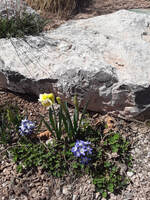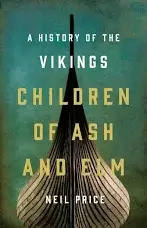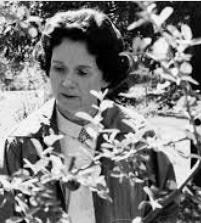Fimbulwinter and The Promise of Spring
 Spring is so full of promise. The emergence of the first, green shoots and the twitter of nesting birds inspires hope in our hearts. But what if, one spring, that didn't happen? How would it affect us?
Spring is so full of promise. The emergence of the first, green shoots and the twitter of nesting birds inspires hope in our hearts. But what if, one spring, that didn't happen? How would it affect us?
 In Children of Ash and Elm, Neil Price suggests that the Viking's concept of Ragnarok, the cataclysmic final battle at the end of the world, might have been formed when volcanic eruptions threw so much ash into the atmosphere that spring seemed not to come. In 536, 539, and 547, major volcanic eruptions, probably in El Salvador at what is now Lake Ilopango, caused world wide ecological consequences that are documented in written sources as far divergent as China, India, the Mediterranean, and the Goths of central Europe.
In Children of Ash and Elm, Neil Price suggests that the Viking's concept of Ragnarok, the cataclysmic final battle at the end of the world, might have been formed when volcanic eruptions threw so much ash into the atmosphere that spring seemed not to come. In 536, 539, and 547, major volcanic eruptions, probably in El Salvador at what is now Lake Ilopango, caused world wide ecological consequences that are documented in written sources as far divergent as China, India, the Mediterranean, and the Goths of central Europe.Fimbulwinter, or Mighty Winter of Scandinavian lore may have been inspired by this. Snorri, in his Edda, says that when Fimbulwinter comes, "there will be great frosts and keen winds. The sun will do no good. There will be three of these winters together, and no summer between."
Dendrochronological records from this period show that trees withered, their growth rings stunted. The failed harvests created riots and famine. In Scandinavia, tens of thousands starved to death, and the population suffered losses of an estimated 50%. Price says that this devastation led to a dissolution of the sociopolitical structures in Scandinavia, and the beginning of what is called the Viking age. What they feared to be the end of civilization proved to be the beginning of a new era.
The Vikings were in no way responsible for the destruction of the ecology in the 6th century. Those volcanic eruptions were a natural occurrence. And while natural disasters continue to happen, it seems that many others are not natural at all, but human made.
 In her 1962 book Silent Spring, biologist Rachel Carson warned that the heightened use of DDT and other pesticides after World War II was going to lead to a human-created Fimbulwinter. In our attempt to choose what species were to live and what were to die because we had deemed them pests, humans were going to destroy the food chain, leading to the death of far more species than we intended. As birds' shells became thinner, their chicks would die. The springtime sound of birds would be no more. Fortunately for us, politicians listened and the crisis was averted. Out of her warnings, a new ecological consciousness developed and a new era of environmentalism was born. The jury is still out on whether COVID-19 was a man made or natural disaster. We still don't know whether this virus developed on its own or in a lab. But for many, the year-long quarantine has felt like fimbulwinter. Once again, society has had to react to imminent disaster. It will be interesting to see how this, too, will lead to a new era. Bird Nest Cookies Celebrate the promise of spring with these not too sweet cookies.
In her 1962 book Silent Spring, biologist Rachel Carson warned that the heightened use of DDT and other pesticides after World War II was going to lead to a human-created Fimbulwinter. In our attempt to choose what species were to live and what were to die because we had deemed them pests, humans were going to destroy the food chain, leading to the death of far more species than we intended. As birds' shells became thinner, their chicks would die. The springtime sound of birds would be no more. Fortunately for us, politicians listened and the crisis was averted. Out of her warnings, a new ecological consciousness developed and a new era of environmentalism was born. The jury is still out on whether COVID-19 was a man made or natural disaster. We still don't know whether this virus developed on its own or in a lab. But for many, the year-long quarantine has felt like fimbulwinter. Once again, society has had to react to imminent disaster. It will be interesting to see how this, too, will lead to a new era. Bird Nest Cookies Celebrate the promise of spring with these not too sweet cookies.
 1/2 cup brown sugar
1/2 cup brown sugar1 cup softened butter
2 eggs, separated (you will need 2 yolks and 1 egg white for this recipe)
1 tsp vanilla
2 1/4 cup flour
1/2 tsp salt
1/2 cup unsweetened shredded coconut
1/3 cup finely chopped pecans
candy coated chocolate eggs or small jelly beans
Heat oven to 350. Line cookie sheets with parchment.
In large bowl, beat brown sugar and butter until light and fluffy.
Add egg yoks and vanilla and blend well.
Add flour and salt and blend well.
Shape dough into 1 inch balls.
In small bowl, slightly beat 1 egg white (use the other egg white for another purpose)
In another small bowl, mix coconut and pecans.
Dip the tops of cookie dough balls into the egg white, then into the coconut and nut mixture. Set on the parchment-lined cookie sheet, coconut side up, 1" apart.
Use your thumb to make an indentation in the center of each cookie.
Bake at 350 for 8-10 minutes, or until lightly browned. As soon as they are out of the oven press a chocolate egg or jelly bean into the dent in the dent in the middle of each cookie before moving to a cooling rack.
Published on April 12, 2021 00:00
No comments have been added yet.



